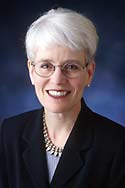
This web page is part of the Michigan Today Archive. To see this story in its original context, click here. |
||||
| President Coleman focuses on health insurance gap
I am one of the 240 million Americans who have health insurance, yet my access to health care services, and the health of my community, are affected by the presence of more than 41 million uninsured Americans. Each person without coverage means greater burdens on the financial and physical capacities of the health care system on which all of us rely. For the past two years, I have co-chaired a committee of the National Institute of Medicine, which is examining the consequences of the lack of health insurance. We have discovered not a schism between those with coverage and those without, but a shared destiny. Through our research and discussions, the committee has found almost universal acceptance of the need for universal coverage. Overall, about one in 10 Michiganders lacks health insurance, compared to a national average of about one in six among people younger than 65, when Medicare kicks in. In Texas, one in four lacks insurance. But being better than average does not mean Michigan is without problems. The substantially higher rates of the uninsured in certain communities result in fewer dollars to support health care and the local economy there. That threatens both health care institutions and residents’ quality of life, as jobs are lost and as health services become less accessible. In other words, inadequate health care for some translates into health care and financial problems for all. As our population ages, and when we face the kind of economic problems we now face, the impacts of these problems are felt in ever widening circles. The patchwork of programs and institutions that substitutes for health insurance is fraying. Detroit may be about to become a case study of how that process plays out. The greatest concentration of people without health insurance in Michigan is in Detroit. The estimated 180,000 residents without coverage far outstrip the capacity of primary care doctors and free clinics that serve uninsured patients. This has led to greater use of local hospital emergency departments for routine health care. Health care providers in America are social institutions and economic entities. Hospitals began as charities and public protectors against communicable disease. As medical knowledge grew, and as access to health care became recognized as a social responsibility in many areas of the country, more people were served, and health care costs rose. Voluntary contributions became inadequate to support our health care system. Increasingly, we financed health care through insurance mechanisms, private and public, and we pushed our health care providers to act more like businesses. Hospitals and doctors faced energized purchasers who wanted them to become more efficient. But the private enterprise model is inadequate for health care. As a society, we will not deny critical care to those who cannot pay. But we also do not provide them with much of the care that doctors and public health professionals deem necessary. Those without health insurance pay for about one-third of their own health care. The remaining two-thirds is uncompensated care, a combination of charity and bad debt. In 2001, uncompensated care amounted to roughly $35 billion, of which 75 to 85 percent was paid for with public funds. Extending health insurance coverage to everyone inevitably would entail some unknowns, because we cannot anticipate every implication and consequence. Nonetheless, that is not a good reason to delay. No one in 1965 envisioned a Medicare program close to what we enjoy today, but I do not know anyone who regrets its passage. While that program has problems that need to be addressed and resolved, we have accorded our elderly a measure of health, medical care and dignity that was unimaginable before. We who serve on the Institute of Medicine committee have worked hard to define the problem; we are also working to define suggestions for possible solutions. The devil, as they say, is in the detail of the solutions, and in our limited ability to anticipate all the impacts. But we should not miss this opportunity to work toward universal coverage. We have a window now, before the increasing demands of the baby boom generation on health care services and dollars makes it even harder for us to achieve what we all recognize as an appropriate role for our society. We must not fail. Write to President Coleman at presoff@umich.edu or at Office of
the President, University of Michigan, Ann Arbor, MI 48109. |
||||
|
Michigan Today News-e is a new, monthly electronic publication for
alumni and friends. |
| MToday NewsE | |||
|
Michigan
Today
online alumni magazine
University
Record
faculty &
staff newspaper
MGoBlue
athletics
News
Service
U-M
news
University of Michigan
gateway
| Site of the Month | |||||||
|
|
• Maps |


